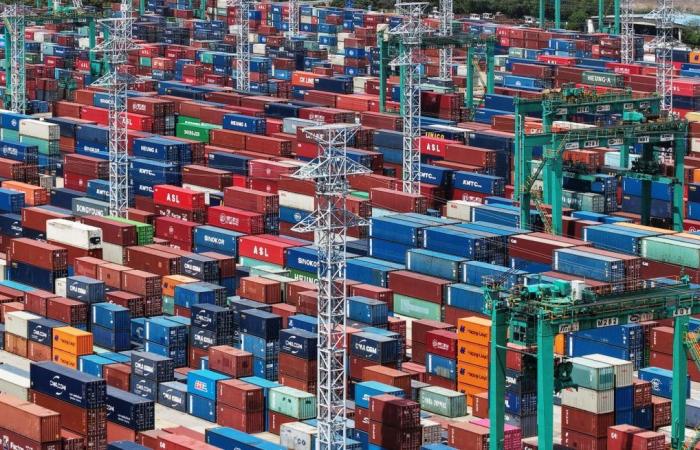This text is the answer to the question of a reader sent to the mail of the economy team. To subscribe, click here.
Given the difficulty of other countries to sell part of their products in the United States, could Canadian importers take the opportunity to get more advantageous prices on these unsold stocks? While avoiding dumping?
The vertiginous tariff climbing between the United States and China went up again last Wednesday, when Donald Trump responded to a Beijing countermeasure and brought the surcharge to 145 %Chinese imports. More than a simple customs barrier, this is a real wall intended to prevent exports from the Asian giant – which quantified at around 440 billion dollars in 2024 – to flood the American market.
Experts and analysts therefore expect the volume of exports from China to the United States to collapse in the coming weeks. China, in industrial overproduction in several sectors (including steel, lithium batteries, solar panel components or electric vehicles), could therefore be looking for new outlets for its products.
In other words, the world factory will have to sell its stocks. This could do the business of Canadian companies.
“With the trade war between the United States and China, it will no longer be profitable for American companies to import Chinese parts used in the manufacture of certain products, for example. On the other hand, for their Canadian or Mexican competitors, it could actually lower prices, because the Chinese will want to sell their production. They will say to themselves: “We may be ready to make less profits, but at least we are not taken with these inventories”, “explains Patrick Leblond, professor at the Higher School of Public and International Affairs at the University of Ottawa.
For some Canadian companies, he believes, this situation could result in a drop in production costs that would compensate for the customs duties they pay to enter the American market.
“Often, what we see, in the commercial field, is that if a market is no longer accessible directly, a musical chair game will set up. We start to say to ourselves: “Can we still access it, but in another way?” The professor is still advancing. Canada could therefore be the big winner of this three -band billiards.
“After the arrest of the two Michaels [Spavor et Kovrig]for example, China had imposed a blockade on the Canadian canola to put pressure on Canada. But in the end, what happened? Qatar began to import canola, transformed it into oil, and then re -export it to China. »»
A boon for dollarama?
The tariff war between Beijing and Washington could also be good news for companies like Dollarama, which import a large amount of manufactured Chinese products. And this, even if the president and chief executive officer of the company, Neil Rossy, defended it last week, during the presentation of the results of the company.
In the toy sector, in fact, almost 80 % of the products sold in the United States come from the Middle Kingdom, according to the Toy Association. Unsned Chinese toys in the United States could then meet well on the Canadian market, and at a lower cost for the consumer.
Often, what we see, in the commercial field is that if a market is no longer accessible directly, a musical chair game will be set up
“The question is always whether it hurts Canadian producers. If Canada does not produce plastic toys of this quality, then people will say: “So much the better, it is the consumer who benefits, it does not hurt anyone”, “says Patrick Leblond.
Ditto for the bicycle industry. Bicycles that are manufactured in China can no longer be exported to the American market due to exorbitant customs duties. They could therefore invade the Canadian or European market, he believes.
“In Europe and Canada, there are still many bicycles manufacturers. But are these manufacturers competition with Chinese manufacturers? Not really, because these are generally companies that make very high quality bicycles. If it’s good for consumers and it doesn’t hurt Canadian companies, then let’s take it! »»
Dumping risks
As for the risks of dumping, they are very real, according to Patrick Leblond. The professor at the University of Ottawa, however, thinks that Canada could guard against it, notably by pressure on the World Trade Organization (WTO).
“There is always a risk of seeing the Chinese dumping to limit their losses. But Canada or the European Union can put in place anti -dumping measures to counter China by saying: “You sell below your production costs, so it’s illegal, depending on the rules of the trade.” They will then impose anti -dumping laws. »»
Canadian companies could therefore impose a customs right, which would bring the price of Chinese exports to a normal price.
“The only issue is that a WTO procedure takes time. What one could imagine, given the current situation, is that a country like Canada would immediately impose customs duties and then go to the WTO in the hope of resolving the situation. We would thus remain in the rules of international game to protect ourselves against unfair competition. »»








